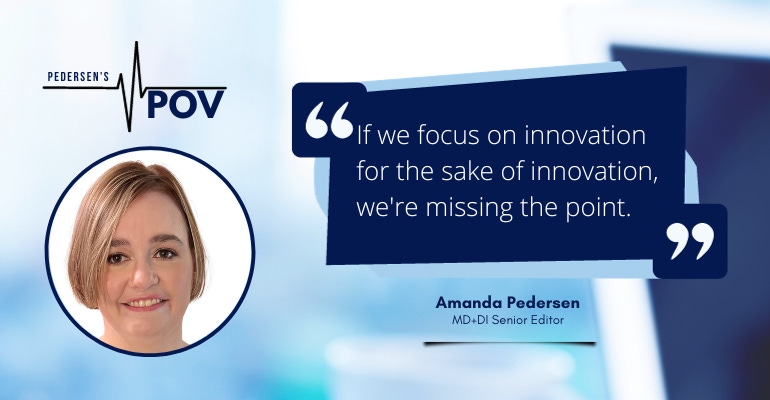Innovation in Medtech Is Overrated
This week in Pedersen’s POV, our senior editor challenges the conventional view of innovation in the industry.
October 9, 2023

Ask 10 of your industry peers to define innovation in medtech and you'll likely get 10 different definitions. Better yet, toss out the question of innovation at your next networking event and it's nearly guaranteed to spark a lively debate.
Jan Beger, senior director of the digital ecosystem at GE HealthCare, recently shared a paper via LinkedIn that proved to be quite the conversation starter. The paper, "What Do We Mean by Innovation in Healthcare?" published in 2017 by the European Medical Journal, begins with a broad definition of innovation and then breaks it down to a healthcare context.
In short, authors Leighann Kimble and M. Rashad Massoud suggest that for a development to be considered an innovation in healthcare, it must introduce something new or significantly different and solve problems related to efficiency, effectiveness, quality, sustainability, safety, or affordability. Kimble and Massoud also point out that not all solutions are innovations, and not all innovations are solutions.
What resonated the most with me as I read the paper, is how the term "innovation" has been diluted over time due to its overuse in healthcare, particularly medtech. If I had a penny for every PR pitch or press release I've received in the past 17 years touting an innovation in medtech, I could have retired in style long ago. In reality, only a very small percentage of those pitches center around any real innovation. That doesn't mean they don't add value to the healthcare system or enable better patient outcomes.
And, as I scrolled through the thread of comments on Beger's LinkedIn post, it occurred to me that, regardless of definition, innovation in medtech is truly overrated.
"Is it really innovation we strive for? We strive for improvement. Innovation is a means to get there," R.A. Bavasso, a digital medicine entrepreneur, commented. "Most of us in healthcare would accept improvement across all facets of healthcare achieved without innovation."
Bavasso went on to suggest that innovation is something that is new to most people in healthcare and immediately raises resistance to change, while improvement is usually embraced.
My definition of innovation in medtech is probably stricter than most. For me to consider something to be truly innovative, it must introduce a completely new and disruptive technique or method.
Transcatheter aortic valve replacement is an example of innovation in medtech as it presented a completely new technique compared to surgical aortic valve replacement. Intuitive Surgical's da Vinci surgical robotics platform would be another example. Pulsed-field ablation (PFA) represents an emerging innovation in medtech, although it might be too early to know yet just how disruptive PFA will be in the field of atrial fibrillation treatment.
The Dexcom G7 continuous glucose monitoring (CGM) device represents a significant improvement in the CGM category, but I wouldn't count that specific device as innovation, even though the team that designed the device approached the project with a clean slate and reimagined everything from the hardware to the software.
Last week I wrote about how iRhythm Technologies designed its next-generation Zio monitor. While the device represents a significant improvement over previous iterations and a valuable solution, I wouldn't call it innovation.
In a similar vein, there are plenty of so-called innovations that don't really offer a solution to a problem or an improvement over an earlier iteration. Google Glass is an example of an innovation that didn't really have the impact in medtech that some early supporters expected.
So, I agree with Bavasso. If we focus on innovation for the sake of innovation, we're missing the point. Improvement should be the real goal, with or without innovation.
About the Author(s)
You May Also Like



.png?width=300&auto=webp&quality=80&disable=upscale)
